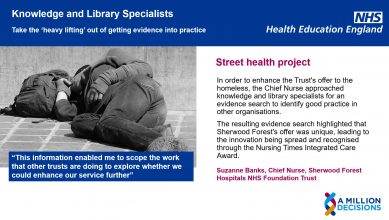Key aspects of the role
- Taking library services out to people in their workplace in primary care settings
- Providing the knowledge and evidence base for workforce development and role re-design
- Supporting the continuing professional development needs of primary care staff
- Delivering knowledge mobilisation, enabling primary care staff to capture and use lessons learned, share know-how and good practice to drive innovation and encourage evidence to be used in practice.
- Undertaking complex literature searches to find research evidence and gathering examples of good practice needed for writing local policies, projects, choosing clinical treatment, answering patients’ questions and for professional development of primary care staff.
- Planning and delivering information skills training and health literacy awareness for multidisciplinary health care professionals across the local health community
- Delivering an information consultancy service for those unable to access NHS library resources easily.

Skills and knowledge
You may require a high level of knowledge and skills in the following CILIP Professional Knowledge and Skills Base (PKSB) sections to work within this role:
Ethics and Values. Underpinning healthcare ethics and values by providing the best available evidence at the right time, in the right place, to inform decision-making and enable better outcomes for patients and populations.
Professional development. Reflecting on practice and being self-aware about performance.
Organisational and environmental context. Understanding organisational priorities and challenges identified by the executive team.
Wider library, data, information and knowledge sector context. Networking across the healthcare economy, both information providers, data analysts and health informaticists, to support shared learning and joint working.
Collection management and development. Ensuring that collections are accessible and meet the diverse needs of the user community, for example digital access and supporting care at the point of need.
Data Management. Identifying and harnessing data’s value in strategic planning and business decisions, using an evidence-based approach to health knowledge service development and policy.
Information exploitation and use. Delivery of information through routes such as alerts, current awareness, enquiries and literature searches, including saving the time of users by providing time-saving services such as synthesis and summaries of evidence.
Information governance and compliance. Tracking and safeguarding of personal information including information audits of the service and the use of information asset registers.
Information management. Advising the organisation on the opportunity to improve information management.
Knowledge management. Embedding knowledge management into ways of working – for example facilitating a Before Action Review before an organisational project commences and an After Action Review at its conclusion.
Literacies and learning. Initiating and contributing to work intended to improve the information, data, digital and health literacy of staff and learners.
Records management and archiving. Appreciation of record management issues arising within the NHS including sensitive data, appropriate disposal of records and systems for ensuring the secure access and use of records.
Research. Disseminating research evidence to inform service and quality improvement and innovation.
Customer focus. Service design and marketing. Engaging with a variety of users across the healthcare landscape to provide a professional and efficient service.
Leadership, advocacy, influencing and personal effectiveness. Showing strong leadership skills in order to ensure the visibility and breadth of involvement of the service across the organisation.
Strategy, planning and management. Considering the context of the organisation served and delivering services to benefit the organisation, users or a specific community of users.
Technology and communication. Networking and advocacy within and outside the local organisation to share good practice, maintain professional awareness, and promote services.
Further information about the CILIP Professional Knowledge and Skills Base